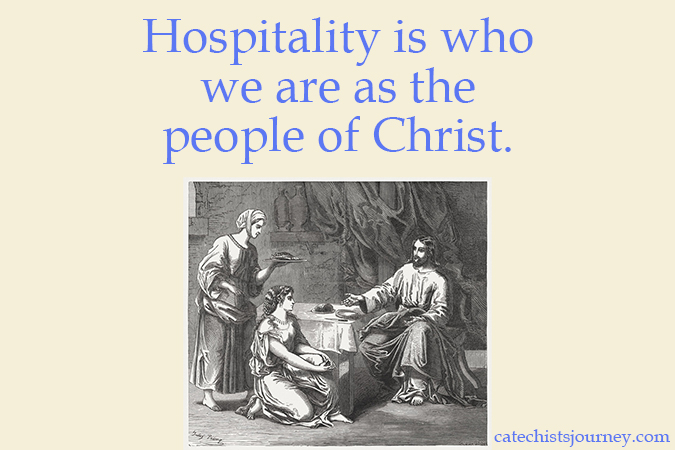
The Christmas season is one of immense opportunity for us to re-engage those who come to church only sporadically. During this time, we should be especially effusive and warm in our welcoming efforts. Unfortunately, hospitality has become synonymous with coffee and donuts after Mass in many parishes. We seem to have relegated welcoming to a particular committee, such as the stewardship committee or the hospitality committee. Not only has this mindset absolved our parishioners of the need to go out of their comfort zones to welcome others, but it also reinforces a mindset that hospitality is something that a particular group of people does, rather than being who we are as the Body of Christ.
Years ago I was hosting a conference at a parish church. Midway through the day I took a break from the conference hall and went to sit in the narthex of the church. As I was sitting there, a woman came in and set up a small table. She explained that she was a member of the hospitality committee and that they took turns to welcome those who came to view the magnificent stained glass windows and art that blessed the church. Visitors signed a little guest book and were given a brochure. They were then free to explore the church and appreciate the windows and art.
After a couple of moments the door squeaked open and a man peered around the door. His hair was disheveled and he carried a sleeping bag on his back. “I heard that this is a place that I can warm up in,” he said. As he entered, the odor of his suffering permeated the narthex.
“This isn’t a warming shelter,” the lady said sharply, “but if you are here to pray, you may do so.” The man nodded and went into the sanctuary.
She lifted the phone. “Can you send someone over here?” she said. I presumed that she was calling the parish office. The next words out of her mouth are words that I will never, ever forget.
“There is an undesirable in the building,” she said. An undesirable.
The door to the sanctuary opened, and the man came back into the narthex. In his hands he carried a large purse. “I think that someone lost this in here,” he said to me.
Before I could thank him, the woman said, “Why don’t you give me that and you can sit over there so that we can make sure nothing is gone from the purse.” The face of the man crumbled, his humiliation now absolute and complete.
After this interchange, the pastor and the deacon from the parish came over. Thankfully, they recognized how cold and hungry the man was. They offered him food and drink, a place to rest, and thanked him for his honesty. The owner of the purse was found, and she gave him a monetary token of her appreciation. The man smiled. I left the narthex and went into the sanctuary, where I cried for some time.
This moment was a powerful lesson in what can happen when the Gospel mandate for radical hospitality has been reduced to a mere human construct. Jesus showed up in his own house in the form of a homeless man, and we didn’t recognize him. Not only did we not recognize him, but he showed up and revealed our hard-heartedness and our stinginess.
True hospitality is not about coffee and donuts or hearts and flowers. Hospitality is about welcoming Christ who is within every person we encounter. If we are going to train our parishioners to be hospitable, we must help them see Christ in everyone. We must train them to welcome everyone into his house in his name. It is not our house, given for just us, to those who look like us, think like us, act like us, or love like us. The house of God is given to all people, but especially the wounded, the difficult, the angry, the broken, and the lost.
The parish is a “sanctuary where the thirsty come to drink,” reminded Pope Francis. At Christmas, let our parishes be, above all, places where we can see Christ in one another, particularly in those who make us a little uncomfortable. Let our parishes be places where the least of all can drink through their year of grief, joy, losses, sorrows, and wounds—a place where they can quench their thirst. Let our parishes be sanctuaries that are capable of warming hearts and bodies in love.
Photo by Marissa Daeger on Unsplash.





Absolutely powerful and sadly true. One of the best blogs I have read in a long time! Thank you so much.
Julianne,
Thanks for the inspiring story. I have to share the guilt ever time that I have suspicious thoughts about anyone. We can never judge a book by its cover and for that matter never judge anyone. Instead let us always see the face of Christ in everyone.
It is in the ordinary moments of the day that we are given more opportunities to help others. If we truly are aware and walking with our eyes open, God is always before us in some person. Thanks for sharing so we are reminded of how gently and humbly our Lord encounters us, and how easy it can be to judge others without even knowing them.